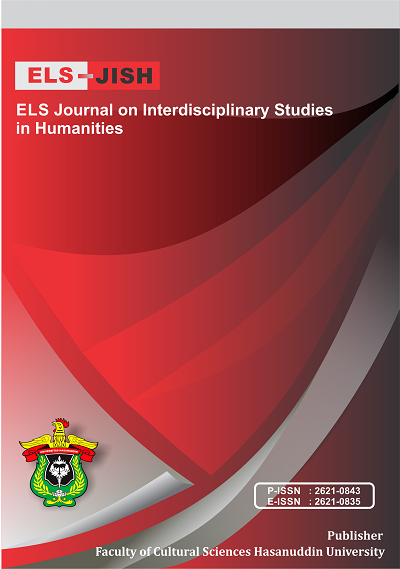The Use of English Language Learning Strategies in learning as Foreign Language
DOI:
https://doi.org/10.34050/elsjish.v7i1.32847Keywords:
English, Foreign Language, Language Learning StrategiesAbstract
The purpose of this quantitative descriptive study is to identify the English language learning strategies employed by university students in North Sulawesi. It also explains the ways in which male and female students approach learning English differently, as well as the kinds of strategies that they most frequently employ. The survey included 91 students enrolled in a Business English course during the second semester of 2020/2021. The SILL questionnaire, with 50 items over six categories, namely, cognitive, metacognitive, affective, memory, and social strategies, was the instrument utilized in this investigation. The findings indicate that when learning English, students in Business English classes mostly employ Cognitive, Compensatory, and Metacognitive strategies. Based on gender, male students tended to employ cognitive strategies, while female students tended to use metacognitive strategies. This study is significant for the English teachers, students, and the school to inform them about the learning strategies that they usually use in learning English.
References
Abraham, R. G. & Vann, R. J. (1987). Strategies of Two Language Learners: A Case Study. In A. L. Wenden & J. Rubin (Eds.), Learner strategies in language learning (pp. 85-102). Englewood Cliffs, NJ: Prentice-Hall.
Afshar, H. S., Bayat, M. (2018). Strategy Use, Learning Styles and L2 Achievement of Iranian Students of English for Academic Purposes. Issues in Educational Research, 28(4). 1039-1059.
Ali, A., Mamuna, G., Malik, F., Ahmad A. (2018). The Use of Language Learning Strategies by Pakistani M. A. English Students in Literature/Linguistics. The Dialogue, XI-3. 324-333.
Amalia, Y., Rahman, F., Rahayu, N. E., Simamora, D. M., & Zulpriyadi, F. (2022). Review the Nature of learning Methods Learning Process in School. Edumaspul: Jurnal Pendidikan, 6(2), 2319-2325.
Aswad, M., Rahman, F., Said, I. M., Hamuddin, B., & Nurchalis, N. F. (2019). A software to increase English learning outcomes: An acceleration model of English as the second language. The Asian EFL Journal, 26(6.2), 157.
Hanafiah, W., Aswad, M., Sahib, H., Yassi, A. H., & Mousavi, M. S. (2022). The impact of CALL on vocabulary learning, speaking skill, and foreign language speaking anxiety: the case study of Indonesian EFL learners. Education Research International,1-13.
Hasnia, H., Andini, C., Tahir, M. D., Hunaeni, H., Zulfikariandi, Z., & Muslimin, M. T. (2022). The Ability of 1st Class Students of SMAN 11 Enrekang to Arrange Verbal and Nominal Sentences. ELS Journal on Interdisciplinary Studies in Humanities, 5(3), 539-550.
Hong-Nam, K., & Leavell, A. G. (2006). Language Learning Strategy Use of ESL Students in an Intensive English Learning Context. System, 34(3), 399-415. http://dx.doi.org/10.1016/j.system.2006.02.002 (accessed 11/2/2018).
Joshi, A., Kale, S., Chandel, S., & Pal, D. K. (2015). Likert scale: Explored and explained. British journal of applied science & technology, 7(4), 396-403.
Kamil, D. (2017). TEFL Students’ Language Learning Strategies: The Case of One State Islamic Institute in Indonesia. Ta’dib: Journal of Islamic Education, 22(2). 70-76.
Naiman, N., Frohlich, M., Stern, H. H. & Todesco, A. (1978). The Good Language Learner. Multilingual Matters Ltd.
O’Malley, J. M., Chamot, A. U. & Kupper, L. (1989). Listening Comprehension Strategies in Second Language Acquisition. Applied Linguistics, 10(4), 418-437. https://doi.org/10.1093/applin/10.4.418
Oxford, R. L (1990). Language Learning Strategies: What Every Teacher Should Know. Boston: Heinle & Heinle Publishers.
Oxford, R. L. & Nyikos, M. (1989). Variables Affecting Choice of Language Learning Strategies by University Students. The Modern Language Journal, 73(3), 291-300. https://doi.org/10.1111/j.1540-4781.1989.tb06367.x
Rahman, F., Abbas, A., Hasyim, M., Rahman, F., Abbas, A., & Hasyim, M. (2019). Facebook group as media of learning writing in ESP context: A case study at Hasanuddin University. Asian EFL Journal Research Articles, 26(6.1), 153-167.
Reid, J. M. (1995). Learning styles in the ESL/EFL classroom. Heinle & Heinle Publishers, International Thomson Publishing Book Distribution Center, 7625 Empire Drive, Florence, KY 41042.
Rubin, J. (1975). What the “Good Language Learner” Can Teach Us. TESOL Quarterly, 9(1),41-51. https://www.jstor.org/stable/3586011
Saud, I. W. (2019). A Contrastive Analysis of ESL and EFL Learning Strategies. Journal of Language Teaching and Research. 10(2). 311-321.
Suzanne, N., Munir, S., & Salsabilah, S. (2023). Students' Cognitive Strategies in Learning Grammar. In Proceedings of the International Conference on Social Science and Education (ICoeSSE 2023) (Vol. 789, p. 361). Springer Nature.
Downloads
Published
How to Cite
Issue
Section
License
Copyright (c) 2024 Daniel Semuel Warouw, Meily Ivane Esther Neman

This work is licensed under a Creative Commons Attribution-ShareAlike 4.0 International License.






